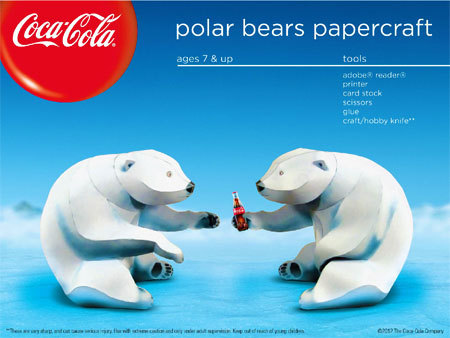- Thumbnail
-

- Resources
- Received from the internet.
- Author
- Unknown.
- Printed File Format
- Page(s)
- 10
- Instruction Format
Sponsored:
Sponsored 2:
Cocacola PolarBear Papercraft
Constantine John Phipps was the first to describe the polar bear as a distinct species in 1774 in his report about his 1773 expedition towards the North Pole.[4][2] He chose the scientific name Ursus maritimus, the Latin for "maritime bear",[15] due to the animal's native habitat. The Inuit refer to the animal as nanook (transliterated as nanuq in the Inupiat language).[16][14] The Yupik also refer to the bear as nanuuk in Siberian Yupik.[17] The bear is umka in the Chukchi language. In Russian, it is usually called бе́лый медве́дь (bélyj medvédj, the white bear), though an older word still in use is ошку́й (Oshkúj, which comes from the Komi oski, "bear").[18] In Quebec, the polar bear is referred to as ours blanc ("white bear") or ours polaire ("polar bear").[19] In the Norwegian-administered Svalbard archipelago, the polar bear is referred to as Isbjørn ("ice bear").

Constantine John Phipps was the first to describe the polar bear as a distinct species in 1774 in his report about his 1773 expedition towards the North Pole.[4][2] He chose the scientific name Ursus maritimus, the Latin for "maritime bear",[15] due to the animal's native habitat. The Inuit refer to the animal as nanook (transliterated as nanuq in the Inupiat language).[16][14] The Yupik also refer to the bear as nanuuk in Siberian Yupik.[17] The bear is umka in the Chukchi language. In Russian, it is usually called бе́лый медве́дь (bélyj medvédj, the white bear), though an older word still in use is ошку́й (Oshkúj, which comes from the Komi oski, "bear").[18] In Quebec, the polar bear is referred to as ours blanc ("white bear") or ours polaire ("polar bear").[19] In the Norwegian-administered Svalbard archipelago, the polar bear is referred to as Isbjørn ("ice bear").

Sponsored: Google Advertising
